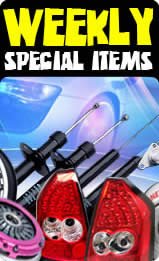Sonar Mitsubishi Eclipse Black CCFL Halo Projector Headlights (aka Spyder Mitsubishi Eclipse Black CCFL Halo Projector Headlights) can be a great upgrade to replace old or worn out stock head lights on your prized Eclipse. Sonar Halo CCFL Projector head lights use a convex lens to project the light of your low beams over a wider area, increasing the overall viewing area of your Eclipse's headlamps. These Eclipse Black Projector CCFL Halo Lights can be a great for improving nighttime driving by allowing to see more of what is ahead and around you.
Sonar (aka Spyder) has long been the most popular brand of aftermarket custom lighting, and for good reason due to their large selection, striking designs, and affordability. These Mitsubishi Eclipse Sonar CCFL Halo Projector Black Head Lamps enhance your night time driving by taking the existing light put out by your light bulbs and projecting it over a wider area, resulting in increased field of vision.
These Sonar Mitsubishi Eclipse Black CCFL Angel Eyes Projector Lamps (aka Spyder Mitsubishi Eclipse Black CCFL Angel Eyes Projector Lamps), like all the other headlights, tail lights and fog lights on our site, come complete with both sides, and should be street legal in most communities.
Tools generally needed to install Mitsubishi Eclipse Headlights
- A full socket wrench set
- Clean gloves to handle the bulbs
- Painters tape to prevent scratches to your Mitsubishi Eclipse
- (Rare) Screw drivers, torque wrenches, etc.
- (For LEDs / Halos) 2 splicers per Halo / LED array
Mitsubishi Eclipse Head Light installation procedure
- Inspect the new set of Mitsubishi Eclipse headlights to make sure you can complete the installation with the tools you have available.
- For safety, disconnect your Eclipse battery's negative battery terminal. If your stereo requires a key code in order to reboot, please be sure you have it before disconnecting the battery. Also, be aware that you will probably have to reset your clocks etc after reconnecting the battery later.
- Park on a level surface facing a wall that you could shine your lights on later to aim your Mitsubishi Eclipse headlamps.
- Apply painters tape along the edges of your bumper and grill along the Eclipse headlights to prevent any scratches that might occur while removing and installing head lights. If uninstalling your Mitsubishi Eclipse front bumper is required, make sure you have a safe surface to place the bumper on and that the working surface below your Eclipse is also safe in the event the bumper falls down.
- Without touching the glass, uninstall the stock Mitsubishi Eclipse Head Lamp, parking, and signal bulbs (as applicable). Depending on the bulb type, this is usually done by just turning the bulb a quarter turn counter clockwise and pulling back. Some vehicles (especially European vehicles) require a few extra steps, such as unclipping a retaining wire or removing a plate that holds the bulb in. Once the bulb is removed, place them in their original container (if available). If they are cold, you could also store them in a ziplock type of bag.
- Unbolt the bolts on the Mitsubishi Eclipse Headlight with a socket wrench. Check the new Eclipse headlights to help locate the installation points on the old Eclipse head lights.in almost all cases the bolt locations will be exactly the same.
- Install the new Mitsubishi Eclipse headlights and bolt in place.
- For Mitsubishi Eclipse Crystal Headlights, reinstall the old bulbs into the new headlights. For projectors, install the end of the male bulb wire plugs on the projectors to your Eclipse's stock harness. Reinstall the parking and signal light bulbs as applicable.
- For halos, splice the negative wire to your Eclipse's parking lights negative wire and repeat with the positive wire.
- Reconnect your battery and turn on your Mitsubishi Eclipse headlamps and adjust until they are both level with the vehicle. The adjusters usually consist of gear looking mechanisms on the back or top of the headlight that are turned via a centrally placed screw and are usually.
- Reconnect all connections and tighten all bolts in place.
Are your Mitsubishi Eclipse headlights sold by the piece or the pair?
All of our headlights are sold in the full pair. When you pay the listed price, you are receiving the complete set including the right and the left sides.
Are these Mitsubishi Eclipse headlights street legal?
To our knowledge, all of the Sonar (aka Spyder) and KS (aka Anzo) brand headlights we sell are street legal as mandated by federal law in the United States. That means basically that they are designed to the specifications set forth by the DOT (United States Department of Transportation). On occasion, DOT may test models to double check for compliance. In cases where these Mitsubishi Eclipse headlights fail (rare) DOT will have the companies issue a recall. For such headlights, we can take them back and refund you. For other brands, we can not guarantee DOT compliance. Also, please be advised that you may have local laws that may disallow these sorts of headlights to be used.
Will these Mitsubishi Eclipse headlights make my car brighter?
No, unless your old Eclipse Head lights are so dirty and yellowed that you could barely see out of them, new Mitsubishi Eclipse Head Lamps will not make your light beam any brighter. While projector headlights can change the way light is spread out over the road (wider area), they will not increase overall brightness. The only way to increase brightness is to upgrade to higher wattage bulbs or to install a set of Xenon HID Kit.
How can I prevent my new Mitsubishi Eclipse headlights from fogging up or letting moisture inside?
During the first few days of operation, it is normal to see some moisture appear in your Mitsubishi Eclipse Headlights. This is due to the small amounts of moisture in the plastic and coating that are evaporated when the headlights are first warmed up during use. This sort of moisture is normal and should disappear within a few days.
To be sure that no external moisture gets into the Mitsubishi Eclipse Head Light though, it is a prudent idea to silicone seal the edges. Clear silicone sealant can be found in any hardware store (and some auto part stores), and can be applied to the seam along the Eclipse headlights where the clear lens meets the rear housing. The $5-$10 is worth it in the long run to protect your investment.
Also, even if a bulb has died, make sure to keep it installed in the Eclipse headlight until you replace it to prevent moisture from entering through the bulb hole.
Can I install Xenon HIDs with these Mitsubishi Eclipse headlights?
This depends. Most headlights have the physical space to install HID bulbs, but even if it fits, you should ONLY USE LOW WATTAGE HID kits. Wattages higher than 35w can create too much heat which may end up damaging the headlight. Also, please be advised that most projector headlights convert your stock bulbs to a different type. Thus, you need to buy the appropriate bulb for the specific projector bulb you are using, usually an H1, H3, H7, or 9006.
While installing the Halos or LEDs, how can I tell which wire is positive and which wire is negative?
Generally speaking, black is always going to be negative. If there are two reds, then you can use either or. If you still can not tell, you can use an electrical tester. It's probably faster to just try it though since you have a 50% chance of getting it right, and if it's wrong you automatically know it's the other way.
On the parking light wires, black is almost always going to be negative. In cases where the parking light serves as a signal light as well, the solid color wire will be the positive parking light wire since the striped wire usually is for signaling function.
Can I install my halos to another light such as my signal lights?
Theoretically you can, but we highly recommend against doing so as it will void the warranty on the Mitsubishi Eclipse Headlights. This is due to the fact that the constant flashing of the halo leads its life to be decreased dramatically. If you are unable to wire the halos to your Eclipse's parking lights, we recommend wiring them to your Eclipse's low beams or installing a separate switch.



















